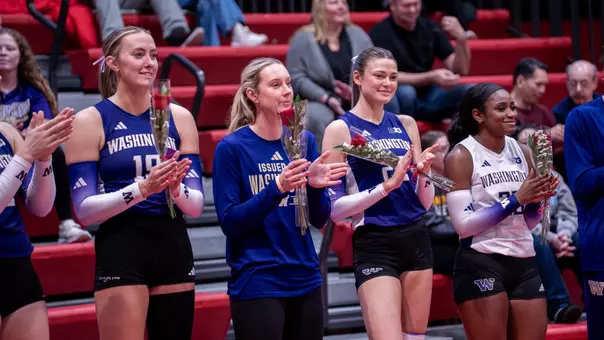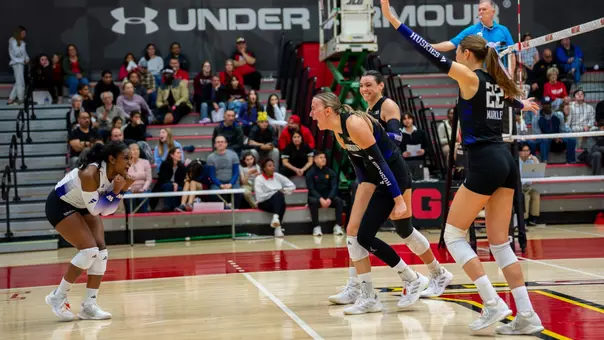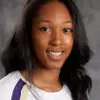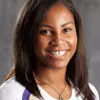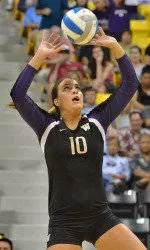
Sanders Reboots Her Volleyball Career At UW
November 19, 2011 | Volleyball
Nov. 19, 2011
SEATTLE - Evan Sanders looked at her volleyball career and had the nagging feeling that it needed a rewrite. On paper everything looked great: a long list of accomplishments starting for the top college team in her home state, NCAA tournament appearances and all-conference honors. But she did not like where the story was heading. Under the circumstances, she was not getting the best from herself. So the competitive Sanders made the difficult decision to start from scratch, with just one year left in her college career.
That last "Washington chapter" of her career is now heading to the gripping conclusion, and the past year has provided its share of twists and turns, with tougher challenges than Sanders ever imagined, but greater rewards as well.
"Coming to Washington," says Sanders before a Wednesday afternoon practice, "I thought I never wanted to touch a ball again after graduation. But now I have just rediscovered my love for the sport."
An All-Mountain West Conference selection as the starting setter for Colorado State in 2009 and 2010, Sanders, nevertheless felt she had reached a plateau as a player. She had only been playing the setter position for those two seasons, but success had always come easily for Sanders, who grew up in Lafayette, Colorado, close to Denver.
"Because I'm from a smaller city the struggle to be a star athlete in that town isn't exactly a big one," she says. "That's not to say I was given anything throughout my career, because I feel like I'm the type of person that tries to earn everything I'm given."
Sanders is not one to dwell on the problems at Colorado State, and is quite complimentary of her former team. "Colorado State is a Top-25 team and they play very good volleyball, have really athletic girls, and the coaches teach them how to play the game," but her motivation began to suffer, and it reached a point where she decided she would stay at CSU and give up the sport, or else find a new setting.
When the call came from Husky Head Coach Jim McLaughlin, the page was turned.
Washington had a potential setter in waiting already in sophomore Jenni Nogueras. Despite facing competition for the starting job, Sanders was confident in her own abilities. "I'm not going to lie, as the competitor I am, I thought for sure I was going to start." The actual nature of the competition was the first thing that would catch her by surprise.
"The biggest challenge for me is that I didn't realize what a battle it was truly going to be with Jenni to earn a starting spot," Sanders says. "But I think with that struggle there have been so many good things that have come from that."
With her small town background, Sanders had never had to fight for her volleyball life with another teammate. But without the expectations of her new coaches and the pressure of her new teammate, "I wouldn't be half the player that I am today," Sanders says. "The improvement that I've shown even in the past six months have been more of an improvement than my first three years in college.
"So I think that goes to show when you're put in that competitive situation here at Washington you're going to rise to the occasion."
Sanders was able to rise to the occasion through the spring and fall practice seasons, and then through the first few early non-conference matches, and she earned the starting spot. The Huskies rolled out to a 15-1 start to the season with Sanders as the six-rotation setter, and climbed to No. 2 in the national polls. Still, Coach McLaughlin had been picked up on a few trends, and despite UW's lofty record and ranking, he thought that the Huskies could operate at an even higher level with a different system. A "6-2" system that would put Sanders into a rotation with Nogueras.
It was a move designed in large part to always allow the Huskies to have three hitters in the front row, increasing the offensive options for a team with a lot of youth on the outsides. Still, the initial reaction from Sanders had to be frustration, as she was about to see the court less.
"That is the initial thing that did run through my head, but I realized those were pretty selfish thoughts," Sanders says. "I believe in every player on our team and the 6-2 put more girls on the floor. So it wasn't a matter of `Why is she playing? She isn't going to do good things for us?' Each girl can do good things for us. It took a couple of conversations with Jim for me to understand that the 6-2 can be a better option for us. We believe one hundred percent in our coaches and that they are going to do what they think is best for the team and each individual in this program. I'm excited and I think we've made progress in the 6-2 and we are really starting to bring it together."
The relationship with Nogueras has only been strengthened as well by the battles. The commitment of Nogueras to continue working each day even when Sanders had first won the starting job earned a lot of respect from Sanders and helped prompt McLaughlin's decision to run the 6-2.
"I think had one person just had the talent and didn't work hard, that would have been a tough situation for the other person to accept, but even halfway through the season Jenni didn't stop challenging me," says Sanders. "She could have easily said, `Evan won the 5-1 job' (and stopped pushing). We just have really grown to appreciate the abilities and skills that each of us have and the different things that we bring to the team."
In addition to learning a new system and establishing a rhythm with half a dozen different hitters, another aspect of dealing with life as the "new girl" was learning to handle the leadership role that many setters are tasked with. Sanders has a quick wit and analytical mind, but even with her competitive streak, she is not an in-your-face presence on the court.
How Sanders operated as the floor general previously in college was "far from the leadership I needed to display here at Washington," and that would be the toughest challenge of this senior year.
"You have to be able to lead your team in the direction that you want to go, be vocal, and have good relationships with the members of your team," says Sanders. "At first I didn't know how to get through to my teammates, or how they would interpret my personality and what I perceived as leading." She cites a saying by McLaughlin: "We need to say and do things to make each other better." Partly to that end, McLaughlin had former Husky All-American Courtney Thompson, now one of the setters on the U.S. National Team, to participate in a couple practices during the second half of conference play.
Thompson sets a high standard with her intensity ("Courtney can not know a girl's name and it seems like they've been playing together forever with the way she interacts with them") but Sanders was encouraged by the fact that she thinks she and Nogueras can get to that level. "She's always trying to figure out what she can do to help her hitters and asking what they need from her which is something I've started to understand that leaders do. When Courtney has been in the gym we've had some of our loudest and most intense practices. It really shows that interactions and personality you bring on the court can change the game in a positive way."
An important move to help speed up that bonding process was Sanders rooming with several players this summer and fall. She currently lives with Amanda Gil, Kaleigh Nelson, Kylin Muñoz, and Jenna Orlandini. Still, even with the close quarters, "the only thing that really could have allowed me to form these relationships was time. I'm kind of sad now that it is as short as it is because I have really formed friendships with these girls."
Washington held its Senior Night last Saturday, honoring Evan, Bianca Rowland, and Lauren Barfield, with Evan's mother Beverly and father Collins among the family in attendance. The night before, UW had knocked off third-ranked Stanford in five sets, but on Saturday, fifth-ranked Cal hung on for the 3-1 win. It was Washington's fourth match in a row against a top-five team, something that is not too likely to happen in the Mountain West, or any other conference than the Pac-12.
"I love it," Sanders says of the cranked up difficulty of her new conference. In the MWC, she might have had off nights but still been able to come out with the win. Not so much this season. "Obviously with a conference like this comes losses that you wouldn't have in another conference. There is never a team where you can sit back and take the night off. Even if you have a loss, the next night you have to go out and figure out how to get better because you don't have time to worry about the night before. It's nice because you're always in the mindset to get better."
The intense competition every day in practice with her own teammate, and on the weekends on the Pac-12 courts, has reignited a spark for Sanders. An Early Childhood & Family Studies major who excels in the classroom, Sanders should be opening any door she wants in the working world. But now it sounds like she just might want to stick with this volleyball thing a while longer.
"I know I'm not ready to be done with it," says Sanders. She plans to go through the Team USA training block after graduation and pursue that, or play professionally overseas.
"I think we've gained so many skills that it would be a waste of so much talent if we just said goodbye to our volleyball careers. I want to give it a try and when I get sick of it or burnt out then I'll go live the normal life of a working adult but I don't see that in my near future."
So the story will be continued.

